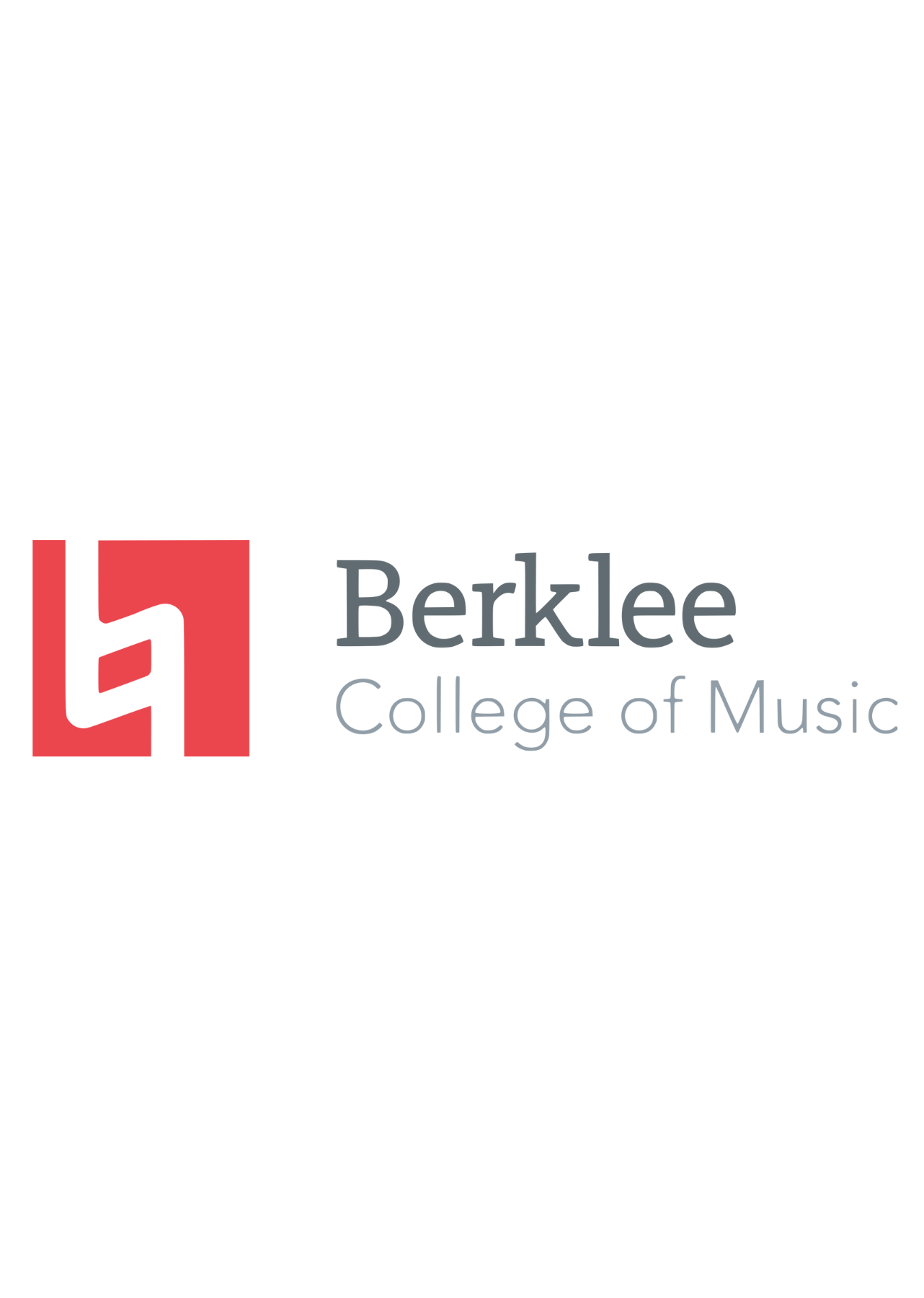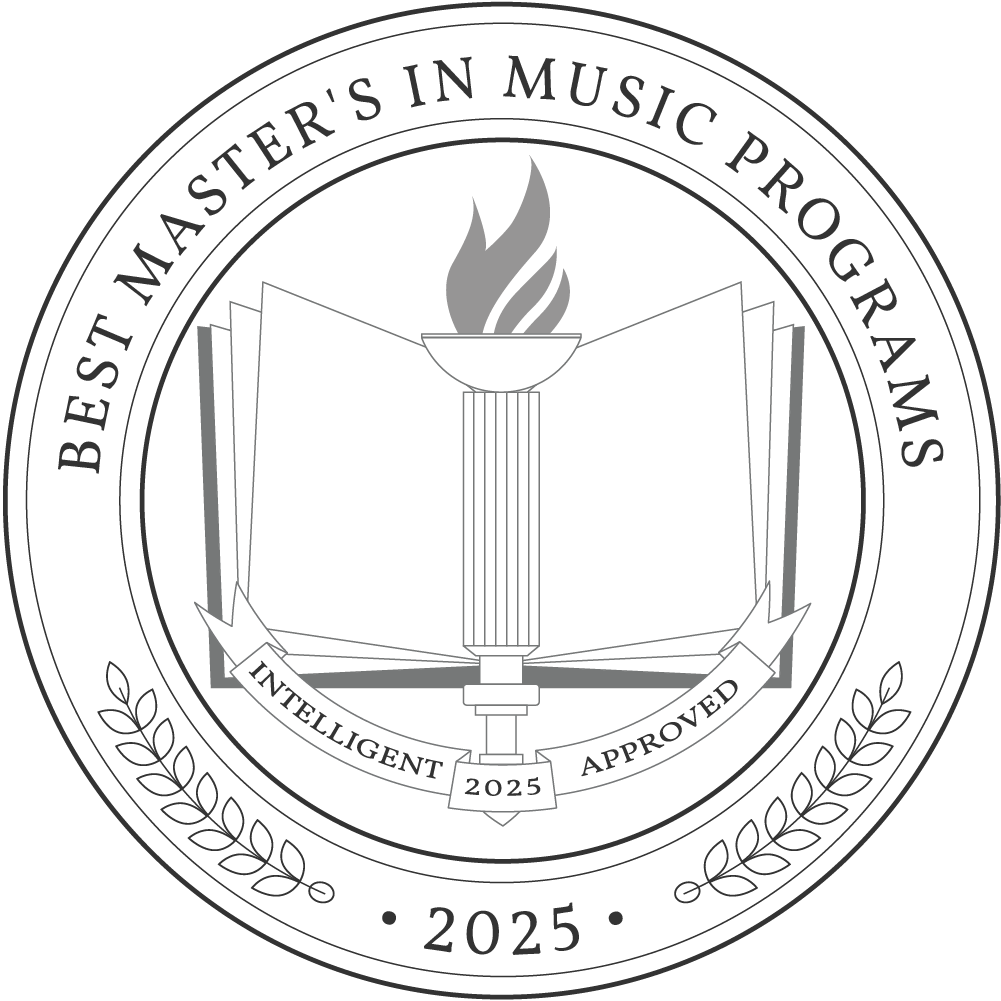A master’s of music degree program prepares students for a career in various music-based occupations, including performance, composition, conducting, and teaching. Most programs require a minimum of 32 credits, which a student can complete with two years of full-time study.
In 2022, a master’s of music degree program cost an average of $20,513 annually. The average salary for a music director and composer is $62,590, postsecondary teachers earn $82,380, and producers and directors earn an average of $82,510. Some professions within the music industry, like production and direction, are growing faster than others.
Why Trust Us
The Intelligent.com Higher Education Team is dedicated to providing students with independent, equitable school and program rankings and well-researched resources. Our expert-driven articles cover topics related to online colleges and programs, paying for school, and career outlooks. We use data from the U.S. Department of Education’s College Scorecard, the National Center for Education Statistics, and other reputable educational and professional organizations. Our academic advisory team reviews content and verifies accuracy throughout the year for the most current information. Partnerships do not influence rankings or editorial decisions.
- Analyzed over 2,000 national, accredited, and nonprofit colleges and universities
- 800+ rankings pages are reviewed and updated yearly
- Content is informed by reputable sources, surveys, and interviews with academic advisors and other experts
- Over 100 data points are reviewed for accuracy and quality throughout the year, including sources
How we rank schools
Our list features the best Music degree programs at top colleges nationwide. Each school featured is a nonprofit, accredited institution — either public or private — with a high standard of academic quality for post-secondary institutions.
We evaluated each school’s program on tuition costs, admission, retention and graduation rates, faculty, reputation, and the student resources provided for online students. We collected data from trusted sources like the National Center for Education Statistics, individual school and program websites, school admissions counselors, and other data sources. Then, we calculated the Intelligent Score on a scale of 0 to 100 based on the following criterion:
Academic Quality:
- Admission rate versus enrollment rate
- Retention rate of students who return after year one
- Accreditation status (regional and programmatic)
- Nonprofit status, both private and public institutions
Graduation Rate
- Overall graduation rate
- Total number of currently enrolled students, including diversity metrics
- Student-to-faculty ratio
Cost and ROI
- In-state and out-of-state per-credit tuition rates and fees
- Required credits to graduate
- Earning potential after graduation
- Availability of federal student loans, scholarships, and other financial aid options
Student Resources
- Available student services for online-only and hybrid programs
- On-campus amenities like tutoring centers and the number of libraries
Read more about our ranking methodology.
Best 25 Accredited Master’s in Music Degree Programs
FiltersInstitution Type
Status
- Intelligent Score
- Alphabetically By University Name
- Acceptance Rate
- Enrollment
- In-state Graduate Tuition
- Out-of-state Graduate Tuition
- In-state Undergraduate Tuition
- Out-of-state Undergraduate Tuition

Rice University
Intelligent Score: 99.78In-state: $50,310
Out-of-state: $50,310
In-state: $47,306
Out-of-state: $47,306
SAT: 1460-1570
ACT: 34-36
$1,175 - $1,442
On-Campus
Southern Association of Colleges and Schools Commission on Colleges
44-54

Northwestern University
Intelligent Score: 98.02In-state: $58,227
Out-of-state: $58,227
In-state: $56,067
Out-of-state: $56,067
SAT: 1430-1550
ACT: 33-35
$1,713
On-Campus
Higher Learning Commission
32-62

Yale University
Intelligent Score: 97.13In-state: $57,700
Out-of-state: $57,700
In-state: $44,500
Out-of-state: $44,500
SAT: 1460-1580
ACT: 33-35
$1,341
On-Campus
New England Commission of Higher Education
72

University of Southern California
Intelligent Score: 96.68In-state: $59,260
Out-of-state: $59,260
In-state: $47,880
Out-of-state: $47,880
SAT: 1340-1530
ACT: 30-34
$2,354
On-Campus
Western Association of Schools and Colleges Senior College and University Commission
30-32

New York University
Intelligent Score: 95.66In-state: $52,204
Out-of-state: $52,204
In-state: $34,704
Out-of-state: $34,704
SAT: 1370-1540
ACT: 31-34
$2,185
On-Campus
Middle States Commission on Higher Education
36-39

The Juilliard School
Intelligent Score: 95.00In-state: $86,582
Out-of-state: $86,582
In-state: NA
Out-of-state: NA
SAT: Not Required
ACT: Not Required
$2,266
On-Campus
Middle States Commission on Higher Education
54-72

Johns Hopkins University
Intelligent Score: 92.26In-state: $54,160
Out-of-state: $54,160
In-state: $57,010
Out-of-state: $57,010
SAT: 1470-1560
ACT: 34-36
$2,589 - $4,315
On-Campus
Middle States Commission on Higher Education
30-50

Michigan State University
Intelligent Score: 89.24In-state: $15,555
Out-of-state: $40,384
In-state: $18,858
Out-of-state: $18,858
SAT: 1100-1300
ACT: 23-29
Resident: $867
Non-Resident: $1,703
On-Campus
Higher Learning Commission
30-35

University of Michigan
Intelligent Score: 86.95In-state: $16,520
Out-of-state: $53,669
In-state: $24,344
Out-of-state: $24,344
SAT: 1340-1520
ACT: 31-34
Resident: $1,931
Non-Resident: $3,493
On-Campus
Higher Learning Commission
30-32

Boston University
Intelligent Score: 86.38In-state: $56,854
Out-of-state: $56,854
In-state: $56,854
Out-of-state: $56,854
SAT: 1310-1500
ACT: 30-34
$1,042
On-Campus, Online
New England Commission of Higher Education
32

Indiana University Bloomington
Intelligent Score: 84.91In-state: $9,815
Out-of-state: $36,194
In-state: $9,786
Out-of-state: $9,786
SAT: 1120-1350
ACT: 24-31
Resident: $719
Non-Resident: $2,251
On-Campus
Higher Learning Commission
30

Texas Christian University
Intelligent Score: 84.08In-state: $51,570
Out-of-state: $51,570
In-state: $32,220
Out-of-state: $32,220
SAT: 1110-1320
ACT: 25-31
$2,145
On-Campus
Southern Association of Colleges and Schools Commission on Colleges
30-36

University of California, Los Angeles
Intelligent Score: 84.01In-state: $11,442
Out-of-state: $41,196
In-state: $11,442
Out-of-state: $11,442
SAT: 1310-1530
ACT: 30-35
Resident: $566 - $755
Non-Resident: $1,055 - $1,384
On-Campus
Western Association of Schools and Colleges Senior College and University Commission
48-63

Southern Methodist University
Intelligent Score: 83.34In-state: $51,958
Out-of-state: $51,958
In-state: $40,896
Out-of-state: $40,896
SAT: 1250-1450
ACT: 29-33
$500 - $1,600
On-Campus
Southern Association of Colleges and Schools Commission on Colleges
30-48

University of Miami
Intelligent Score: 83.27In-state: $52,080
Out-of-state: $52,080
In-state: $45,288
Out-of-state: $45,288
SAT: 1250-1420
ACT: 28-32
$2,421
On-Campus
Higher Learning Commission
33

The University of Texas at Austin
Intelligent Score: 83.04In-state: $11,448
Out-of-state: $40,032
In-state: $12,028
Out-of-state: $12,028
SAT: 1210-1470
ACT: 26-33
Resident: $575
Non-Resident: $1,067
On-Campus
Southern Association of Colleges and Schools Commission on Colleges
30-33

Berklee College of Music
Intelligent Score: 81.66In-state: $44,360
Out-of-state: $44,360
In-state: $42,973
Out-of-state: $42,973
SAT: N/A
ACT: N/A
$1,660
On-Campus
New England Commission of Higher Education
30-42

University of Rochester
Intelligent Score: 80.70In-state: $57,188
Out-of-state: $57,188
In-state: $49,792
Out-of-state: $49,792
SAT: 1330-1510
ACT: 30-34
$2,050
On-Campus
Middle States Commission on Higher Education
30-36
How to Choose a Master’s in Music Program
Choose your area of study
Consider your personal and career goals before applying to a music school or program. Your goals will influence what type of program you choose.
In most cases, degree options include a Master of Music (M.M., M.Mus.) or a Master of Music in your declared music major. For example, a master’s music student majoring in composition will attain a Master of Music in Composition.
Areas of study for a Master of Music program usually include performance, conducting, teaching (pedagogy), or composition. More specifically, a program might offer concentrations in music education, music theory, collaborative piano, and string instruments.
Research schools and programs
As you research potential programs and institutions, focus on accredited schools. A program’s regional or national accreditation, or lack thereof, can impact your ability to transfer credits from your undergraduate degree and attain funding.
To learn more about the program, visit the school’s website and contact the program representative or admissions counselor. If possible, tour the campus and facilities. If an in-person visit is impossible, you can attend a virtual open house or information session.
Prepare for tests and applications
To apply for a master’s in music, you can expect to submit:
- Transcripts
- Resume or CV
- Letters of recommendation from music professionals
- Proof of undergraduate degree in music or arts
- A statement of purpose or personal essay
- A completed application and fees
In addition to these documents, acceptance into most master’s in music programs involves an audition and video recording of your skill.
Depending on your area of focus, you may also need to provide a statement of teaching philosophy (pedagogy), research papers, GRE scores, and complete an entrance exam.
Some institutions require an application to the school and the program. The application process varies by school and program. For the most accurate information, contact an admissions counselor.
Select your program
The application process for many master’s in music programs is rigorous, and it can be tempting to go with the first institution that accepts you. Before you commit, review your needs and goals and set parameters for your logistical needs, including whether you can enroll in part-time or full-time coursework.
Consider your opportunities for personal and artistic growth. Many programs emphasize individuality and originality, aiming to develop your talents and prepare you to be a well-rounded artist after graduation. For guidance and additional insights, speak with an admissions counselor, program representative, or faculty member.
Determine how you’ll pay for your degree
Financial considerations are often at the forefront of many students’ minds. Consider completing the Free Application for Federal Student Aid (FAFSA) form. Schools use the results of this application to determine eligibility for need-based aid.
You can also contact the admissions counselor or program administrator for program-specific financial aid, grants, and scholarships.
Another often untapped option for financial aid is non-profit and community organizations. Before applying, research the organization to understand its purpose and beliefs. In your essay, detail how your career goals and personal aspirations align with their ethos.
What Can You Expect From a Master’s in Music Degree Program
A prospective master’s in music student can expect to advance their skills in performance and composition and deepen their knowledge in musical theory, history, and pedagogy.
Most programs take up to two years of full-time enrollment to complete, and the required course load averages 36 credits. Students should prepare for a combination of lab and lecture coursework. Graduate apprenticeships are common.
In addition to completing the required coursework, graduation from a master’s program can involve a juried degree recital, comprehensive exams, and a master’s thesis demonstrating original research in an area of musical study.
Potential courses you’ll take in a master’s in music degree program
- Analytic Methods for Music and Media. This course explores music through the framework of modern media, emphasizing analytic and interpretive methods. Topics include installations, games, videos, television, and film.
- Research Methodologies in Music Pedagogy. This course explores the research methodologies of music pedagogy. Topics include theoretical frameworks and methods originating from the social sciences.
- Professional business practices. Students learn the core practices of the music industry business. By the end of the course, they will be able to demonstrate their competency and knowledge of marketing and promotion, entrepreneurship, and the characteristics of performance contracts and publishing.
- Research and Editions. This course guides students through the research and evaluation process to discover editions of compositions that represent the most and least authoritative versions. Students will journal their weekly findings and provide evidence to support their conclusions.
- Text, Form, and Narrative in Instrumental Music. Students explore major instrumental genres in Western traditions from the 17th century to now. They’ll discuss the relationship between notated instrumental music, programmatic titles, and implied narratives in the score. Outcomes include an ability to produce stylistically relevant storytelling through harmony and form.
Master’s in Music Degree Frequently Asked Questions
How do I apply to a master's in music degree program?
Apply for a master’s in music degree program through the school’s website. Students can expect to submit test scores, transcripts, and proof of completion of a bachelor’s degree in music or arts. Most programs ask for at least three letters of recommendation from a music professional, a statement of purpose or personal essay, and a resume or CV.
In addition to these materials, students may be required to submit a video of their performance and complete a juried audition. Students applying for a master’s in music teaching specialty also need to submit their GRE scores and a video demonstrating their teaching style.
How much does a master's in music degree cost?
The average tuition for a master’s in music is $20,513 a year. Tuition costs are higher at most private schools than public schools. Students can anticipate additional costs for course material and school-specific costs like medical insurance or student services.
The annual tuition does not include accommodations, meals, and personal expenses. If you are considering living on campus, compare the average cost of living off campus with the cost of room and board — also, factor in transportation, parking, and the time spent in transit when comparing costs.
Scholarships, grants, and other funding will reduce your total out-of-pocket expenses.
How long does it take to earn a master's in music degree?
A master’s in music generally takes two years to complete. Coursework for these programs is immersive, and the field is competitive — practice and commitment to your musical skill set will further your ability to demonstrate proficiency through performance. This demonstration is a part of your final graduation from the program.
Expect to complete at least 36 credits for your master’s degree. These credits are in addition to the completion of a prerequisite baccalaureate. Some programs make considerations based on skill, experience, and demonstrated knowledge.

